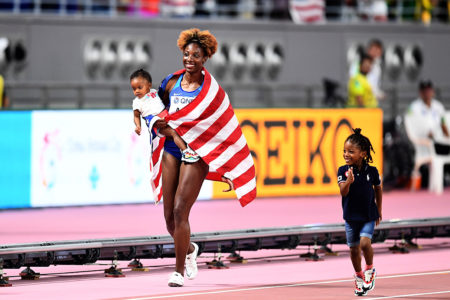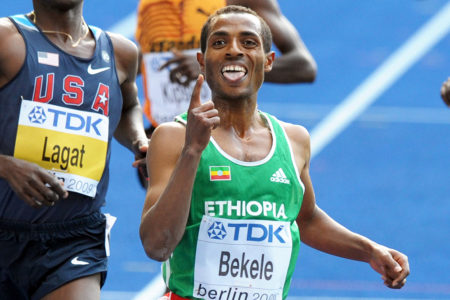
WORLD CHAMPIONSHIPS XVII in Doha rang down the final-final curtain on the Usain Bolt era and in the always-center-stage 100 Christian Coleman decisively installed himself as the favorite for the Tokyo Olympics in 10 months’ time.
“It’s been an incredible day,” said the for-now-firmly-established man at the top after his PR 9.76 had moved him to No. 6 on the all-time world list. “I woke up this morning and I just said my prayers, thankful that I had this opportunity. I’ve been waiting for this day since 2017 when I got a silver medal, and I knew I wanted to come out here and upgrade that. There’s only one spot that you can go from silver and I was able to get a gold medal and bring it home to American soil.”
Coleman isn’t Bolt. He’s proud to be Christian Coleman. “Are you going to see Usain Bolt [style] dancing and stuff?” asked Coleman’s manager, Emanuel Hudson. “You’re not going to see that. But at the same time what he gives you is going to be genuine, it’s not going to be made up. And he’s a purist. He’s like old-school guys.”
Ask Coleman who inspires him and he thinks for a beat, that’s the kind of guy he is, then says, “I’d say my biggest inspiration is probably my parents. They did a lot for me and my sisters growing up, made a lot of sacrifices, and when I step to the line, it’s not just me stepping to the line. It’s my whole family, my whole support system, my whole village that got me here. And they tell me all the time, they tell me that they be tired at the end of the race because they were running right there with me.”
Coleman, Hudson says, “comes from a very good family. When I mean good family, they’re in the education system, his mother has a doctorate in education, his father works for the schools in Atlanta. Both sets of his grandparents, for example, come to his meets. He goes generational, he’s got a whole family of cousins and relatives that treat him like a regular guy. I wish you could talk to one of his cousins. It would make you laugh because they tell you a story about Christian in the 4th-grade or whatever and he’s running for class office. He stands there and his cousin gives the whole speech. He had like campaign managers. They go, ‘Christian’s the one that won the races.’ He won the election with his campaign managers, his cousins. My point is he comes from a very close family and they are very supportive and he’s a very simple kind of straight guy, too. Very simple guy, very easy guy, and I think that he is going to do extremely well because he has a very good work ethic and he’s genuinely a good person, he’s a nice person.”
Asked after blasting to gold with a gun-to-tape run if he felt he had something to prove, Coleman said, “That’s just my lifestyle. I feel like I always walk around with a chip on my shoulder. Just being from where I’m from, not many people are expected to make it out or expected to do something of this magnitude. So I was just grateful for the opportunity. But I think coming from where I’m from on the south side of Atlanta, Georgia, I think everybody just has a chip on their shoulder, that competitive edge that makes a lot of athletes great that come from there.”
Operating over the summer this year in the glare of the media, social and traditional, Coleman passed through some turbulent moments. First in response to a tweet he made after losing his first—and as it turned out, only—100 of the season to Noah Lyles at the Shanghai DL in May, both timed in 9.86:
“Seems as if some people are confused. It’s nothing wrong with a PR. But if your goal is to run fast in May to taunt and flex online then your priorities aren’t straight imo. The season is just getting started.”
Seems as if some people are confused. It’s nothing wrong with a PR. But if your goal is to run fast in May to taunt and flex online then your priorities aren’t straight imo. The season is just getting started
— Christian Coleman (@__coleman) May 20, 2019
News flash. Some sports fans love perceived trash talk as much as competitions. “Just fist fight him already smh,” came the second tweet in response, distilling a pro wrestling view of things. Per Hudson, Coleman was caught off guard. “The press made a big deal about his statements about Noah in China,” the agent says. “Total misperception. For Christian, he’s like, ‘I don’t understand. It’s my first race. Don’t people know that you race and you get faster through the year and that you are actually training?’ I’m like, ‘Christian, yes, people who know the event, people who know the sport, know that, but the general public doesn’t necessarily know that.’ So that’s why it got all these bumps. Literally, he was perplexed; ‘I don’t get it, I don’t understand.’ Christian’s comments were based on him. Him dealing with him, not comparing to someone. The guy’s genuine so this is not going to be Ali–Frazier. OK, it’s not going to be there. Unfortunately, it’s not. Or fortunately.”
Not for Lyles, the 200’s man atop the mountain, either. Both sprinters have tamped down the controversy in public comments since. It’s enough to know that when Coleman dashed to his USATF 100 title in June, Lyles was in the stands cheering and applauding vigorously.
We also know the two bookended the 4×1’s drought-busting gold medal dash in Doha. Not everyone knows, though, what Coleman did after a couple frighteningly shaky handoffs in the U.S. squad’s heat race. Word got around, though, and the 100 champ and relay leadoff man was asked about it after the final. Coleman explained, “I just messaged all the guys and just said, ‘Can we have a meeting tomorrow to just kind of reflect on what happened yesterday and what to do better?’ Without the coaches, without any outside influences—just so we could have that cohesiveness and that open dialogue so that we can come together and get the job done. We knew we had the talent, we just had to take care of the passing, take care of the handoffs. We just had a conversation before and everybody just said what they could do better and how they could improve. It was an open meeting about how we could come out here and get the gold.”
In August, as the track world knows, Coleman was hit with another off-track travail, the leaked information USADA was investigating him for an alleged whereabouts violation, supposedly 3 missed tests in an 18-month period. The possibility of a significant suspension rolled in like a thundercloud over his head. Then, 2 days before the hearing, USADA admitted a mistaken rule interpretation and the anti-doping agency conceded Coleman, who had undergone and passed 20 tests since ’18, was innocent of any violation. Repeat, no violation. On the BBC, though, during the World Championships long sprint legend Michael Johnson high-horsed that the sequence of events disqualified Coleman from any consideration as “the face of the sport.” So much for due process.
“Michael Johnson doesn’t pay my bills or sign my checks so I don’t necessarily care what he has to say. At the end of the day it’s not something I focus on,” Coleman said once he had the Worlds 100 gold around his neck. “I didn’t miss 3 tests so it’s a false accusation. This is a first-time thing and I’ve been tested a lot of times.”
Doha silver medalist and ’17’s world champion Justin Gatlin—who noted he was 14, “a teenager about to drive” when Coleman was born—declared that the new world champion has “put together great races this season, especially his transition phase is unbelievable.” Coleman, assessing himself, gave his PR 9.76 race in almost-October an A-minus. “I was able to come out with a win so I guess I give myself an A for that,” he said. “But it was A-minus because there are definitely some things I can improve. It certainly wasn’t a perfect race. I don’t feel like I’ve put that together yet. I feel there are some things I can work on.”
Coleman’s main takeaway from his global victory on the shores of the Arabian Gulf was an added plate for his competitive armor: “That I had confidence before but I feel like any time you can step to the line and come out with the win on top of a field like that it just gives you a confidence boost from before, in just knowing that no matter what the circumstances I’m up against, no matter how I’m feeling, anything like that, I can always fight back from it and come out on top.”






